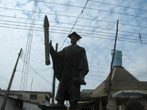New African elites: A Tanzanian profile

As part of a broader effort to consider who’s who in Tanzanian society, Chambi Chachage discusses the reproduction of the country’s elite class and stresses that if you want to understand the underprivileged, you must also study the privileged.
This is a synopsis of a larger project of sketching the biographical journey of a class constituting the African elites. It is a self-imposed attempt to make sense of ‘who is who’ in Tanzania – for what and for whom? In other words, it is about how and why new elites (re)shape our society.
As a group, African elites have nationally been influential culturally, intellectually, politically and even economically across four generations. Of course they do not necessarily constitute a class in the Marxian sense so eloquently analysed in Professor Issa Shivji’s seminal book on ‘Class Struggles in Tanzania.’ Rather, in a loose Gramscian sense, it is a slightly differentiated class of traditional vis-à-vis organic intellectuals who contentiously chart the country’s direction(s).
It is not by accident that a son of a pioneer church planter in Tanganyika becomes a leading medical institution builder in Tanzania and his son a key civil society organiser. Similarly, it is not by ‘political accident’ that a son of a civil servant becomes a president and his son an upcoming legal broker-cum-political strategist. Indeed, it is not by ‘accident of birth’ that we talk of ‘political families’ with siblings who run ministries, embassies, universities – and even the United Nations.
Probably wary of ad hominem, we no longer systematically study the African elites. This could be due to the fact that, regardless of Mwalimu J.K. Nyerere’s success in containing the exclusive growth of this group through an egalitarian primary education system, African intellectuals are reproducing themselves as the educated elite. Yes, we are this privileged group. And it is not fun to critically study ourselves. So we study others – those we call the ‘poor’ and ‘marginalised’. As the famous Kiswahili adage goes, ‘mkuki kwa nguruwe mtamu, kwa mwanadamu uchungu’!
In his yet unpublished PhD thesis entitled ‘Socialist ideology and the reality of Tanzania’, Professor Seithy Chachage dedicated a whole chapter to the study of the first of these African elites. He aptly periodises their time as that of the ‘systemization of African civilization’. It contains a biographical analysis of the likes of Paul Bomani who, as I came to know later, was fondly called Kishamapanda – the Trailblazer – by members of a cooperative movement that he led.
Chachage thus describes one of the ‘modern Tanganyikans’: ‘Martin Kayamba, a tall, powerful man, elegantly dressed and well-educated, widely travelled and with fluent command of English; whose father was the first Tanganyikan to be educated in Britain before the German invasion of the country, was a model of “sophistication to which the young men aspired” in the 1920s.’
The same source thus quotes Dr. E.F. Mwaisela from whom we get the name of the famed ward at our Muhimbili National Hospital: ‘The general outlook at present [in 1943] as far as my life is concerned is very gloomy. I have been brought up to such a level in life that I can neither cope with my own people’s life, nor that of a civilized man. To get married to a girl of any reasonable standard, for instance, in order that I should maintain that standard of education I enjoyed in school, is literally to commit suicide.’ Indeed, the educated had started to single themselves out.
When one of the first batches of post-independence educated elites marched to the state house in 1966 in protest against the then national service scheme, they met this stern rebuke from their fellow elite, Nyerere: ‘We belong to the same class of exploiters. I belong to your class. Where I think three hundred and eighty pounds a year (the minimum wage that would be paid in the National Service) is prison camp, is forced labour. We belong to this damned class on top’!
Nyerere thus continued to rant: ‘Everybody in this country is demanding a pound of flesh. Everybody except the poor peasant. How can he demand it? He doesn’t know the language. Even in his language he can’t speak of forced labour. What kind of country are we building?’ What happened afterwards is history. He slashed his presidential salary by 20 per cent. Then he sent students home to their villages and towns. This action remains debatable but the point made is still well-taken.
The children of this generation of yesteryear protestors are now holding business roundtables to chart the future of the ‘market economy’ in Tanzania. Others are running for parliamentary seats with eyes glued to ministerial posts, if not the presidential post. Yet others are in policy dialogues in what we mistake for the civil society busy daydreaming of ushering a mass social movement.
What we are seeing now in Tanzania is a systematic consolidation of new African elites. The passing of the mantle or baton from the previous generations of elites to the current one is more pronounced now than ever, especially in the corporate world and the political arena. But will this (re)production of the educated – indeed the business and political – elite as the driving ‘middle class’ force propel us into the concert of ‘developed countries’? Or will it continue to enrich the few at the expense of the majority and thus further widen the gap between the rich and the poor?
This is what we need to study closely – the nature and purpose of new African elites. If we want to understand the marginalised, let’s first understand the privileged. It’s two parts of the same coin.
http://www.pambazuka.org/images/articles/495/africas_liberation.jpg
BROUGHT TO YOU BY PAMBAZUKA NEWS
* Chambi Chachage is co-editor of [email protected] or comment online at Pambazuka News.
